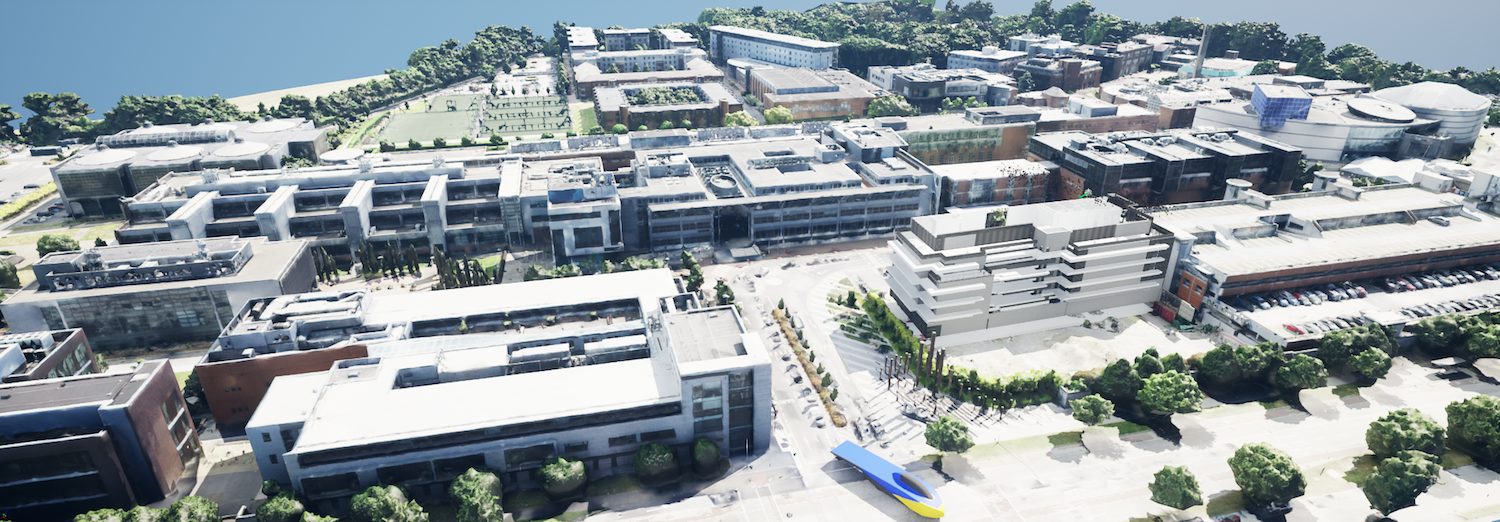
Dublin City University is using a digital twin of its campus to test smart city technology, bringing AI and a digital twin together.
Dublin City University (DCU) has teamed up with Dublin City Council, Insight SFI Research Centre for Data Analytics, and Bentley Systems to push the boundaries of digital twins.
DCU sought to advance its existing Smart DCU programme, which is using the university campus as a test site to explore and evaluate the latest advances in smart city solutions. This collaborative initiative is investigating the power of AI and immersive digital twin technology using the university as a city microcosm for developing intelligent and sustainable urban spaces.
Kieran Mahon, Smart DCU project facilitator at the university, says: “The DCU campus [is] an ideal living laboratory for this purpose, as it replicates the essential features of a real city, including accommodations, roads, retail areas, and other urban amenities, albeit on a smaller scale.”
The project involves establishing AI algorithms and digital twins to simulate and visualise scenarios and using predictive analytics to improve mobility and safety on campus, as well as enable real-time monitoring of building performance, occupancy and air quality. The goal is to gather digital insight to help the university better understand how people, traffic, and buildings interact within the built environment, and thus make more informed decisions.
Focusing on exploring AI and 3D immersive technologies to visualise complex environmental and contextual data in real-time, the intelligent collaborative project aims to showcase an exemplary smart city ecosystem.
“It’s not just about engaging visualisations or simple gauges, it’s about identifying patterns and mismatches to drive meaningful action.”
Professor Tomas Ward, site director of the Insight SFI Research Centre for Data Analytics at DCU, says: “The combination of Bentley’s expertise in digital twin technologies with Insight’s expertise in data analytics and AI through the team at DCU unlocks potential that would not otherwise have been accessible.”
Holistic approach necessary
DCU began by using various IoT, radar and environmental sensors to collect and monitor data. Some of this data related to noise, occupancy, traffic patterns, mobility, waste collection, energy usage and other relevant measurements to support intelligent campus functionality. In some cases, it required installing new traffic lights and infrastructure.
While each sensor individually achieved its data collection and measurement goals, this information was disparate, limiting the potential for smart campus operations. “It became evident that a holistic approach was necessary to maximise the potential of these individual initiatives,” says Mahon. To establish its smart city initiatives, DCU required insight into real-time visual data for holistic decision-making.
The sheer volume of the data generated was also problematic, surpassing the human capacity for analysis. To maximise data capture and analysis potential, DCU realised that it needed to integrate this voluminous, multi-sourced, siloed data. “There was a need for a platform that could integrate and leverage the data from these diverse sources, creating a more efficient and comprehensive smart city solution,” says Mahon.
The integrated data platform also needed to harness the power of AI, establishing a fully immersive digital twin environment to visually analyse the data and provide actionable intelligence to optimise campus operations, enhance resource allocation and ensure sustainable growth.
Meaningful action
DCU selected Bentley’s AssetWise, part of Bentley Infrastructure Cloud, and iTwin applications to create a campus model integrated with IoT data, generating an immersive digital twin. Incorporating AI into the digital twin enabled a comprehensive, real-time 3D perspective of the campus, facilitating the understanding of the various factors that influence operational efficiency and the overall experience of people on campus.
“It’s not just about engaging visualisations or simple gauges, it’s about identifying patterns and mismatches to drive meaningful action,” says Mahon.
Using Bentley’s digital twin technology, the team built a 3D campus model and overlaid it with real-time IoT sensor data that can be used for operational efficiency, decision-making and planning. “By using the Bentley ecosystem, we were able to create a detailed 3D model of the university campus and integrate diverse IoT data feeds from various vendors in a fast, efficient manner,” says Mahon.
“Embracing AI and digital twin technologies unlocks the potential for widespread understanding, collaboration and innovation, creating a brighter future for urban environments.”
Bentley’s iTwin Platform enabled valuable AI insights to be presented in the digital twin. Real-time AI data analysis is conducted, and the resulting insights presented visually, in an immersive digital environment where patterns and discrepancies can be detected, ultimately leading to actionable decisions. This AI-driven digital twin allows for the development of smart and adaptive systems that respond dynamically to changing conditions, optimising energy usage and enhancing user experiences. “We believe that AI-driven solutions hold the key to unlocking a new era of urban management,” says Mahon.
Digital twin validated
Cooperating with Bentley and Insight, DCU has harnessed the potential of data analytics, IoT and digital twins in an interconnected virtual environment to create a smarter, more sustainable campus. DCU has unlocked numerous opportunities and benefits, enhancing efficiencies, streamlining processes, and improving decision-making. DCU has validated the effectiveness of its digital twin application, achieving better mobility, connectivity enhancements, academic integration and cost savings, thereby improving the daily experiences of students, staff and visitors.
“Embracing [AI and digital twin] technologies unlocks the potential for widespread understanding, collaboration and innovation, creating a brighter future for urban environments,” says Mahon.
Don’t miss out on BIM and digital construction news: sign up to receive the BIMplus newsletter.












